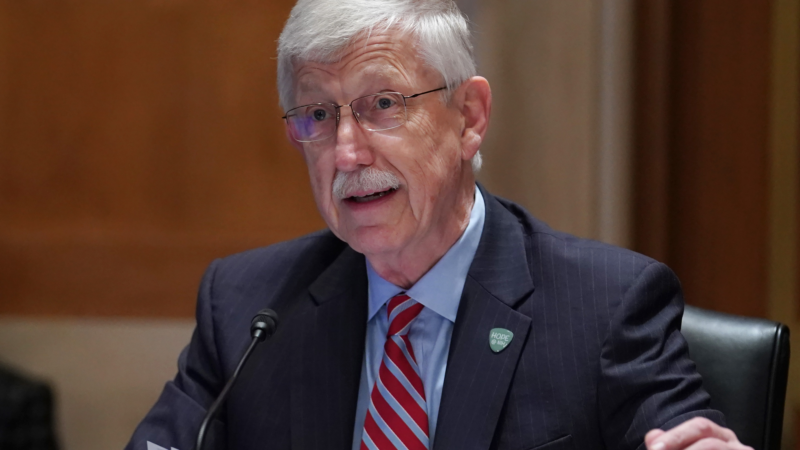Legendary former NIH director retires from embattled agency
Dr. Francis Collins, the legendary former director of the National Institutes of Health, has retired, NPR has learned.
Collins, who notified the NIH on Friday of his decision, did not specify the reasons for his departure. But his retirement comes as the world largest funder of biomedical research is in turmoil under the Trump administration, facing cutbacks and layoffs.
“I have loved being employed by this extraordinary, life-giving institution for 32 years.” Collins wrote to a statement dated Saturday.
” I will continue to devote my life in other ways to seeking knowledge and enhancing health, to healing disease and reducing suffering, and to doing what I can to bring together our fractured communities around the shared values of love, truth, goodness, and faith.”
Collins, who joined NIH in 1993 and led the agency from 2009 through 2021 under three presidents of both parties, stepped down as NIH director in 2021 and returned to his lab at the agency.
Music, religion … and science
Collins, a guitar-playing geneticist who discovered genes for a number of diseases and lead the historic Human Genome Project that mapped the human genetic blueprint, is a rare figure in the scientific world. An evangelical Christian, Collins espoused that science and religion could co-exist.
But Collins, and Dr. Anthony Fauci, the long-time head of the National Institute of Allergy and Infectious Diseases, were bitterly criticized by some members of Congress and others during and after the pandemic.
Collins’ retirement was effective Friday. The NIH did not issue a statement.
Dr. Ashish Jha emailed NPR about the news: “Francis Collins is one of the most important scientific leaders of our era,” wrote Jha, the dean of the Brown University School of Public Health who served as President Biden’s COVID-19 response coordinator. “As a scientist and as a leader of NIH, he helped usher in the era of genomic medicine and so many of the cures we are seeing now are due to his vision for what mapping the human genome could accomplish.”
Jha also noted: “There have been criticisms of his leadership during the pandemic and no one managed things perfectly, But he marshalled the scientific forces of the NIH to help us launch a vaccine in record time, ” Jha wrote in an email to NPR. “We all owe Dr. Francis a large debt of gratitude.”
The future of NIH
His retirement follows the departure of other top leaders at the NIH.
“As I depart NIH, I want to express my gratitude and love for the men and women with whom I have worked side-by-side for so many years. They are individuals of extraordinary intellect and integrity, selfless and hard-working, generous and compassionate. They personify excellence in every way, and they deserve the utmost respect and support of all Americans,” Collins wrote.
The NIH is among the federal agencies reeling from the Trump administration’s campaign to downsize the federal government. NIH has lost about 1,200 employees in the layoffs so far. At the same time, the Trump administration has restricted the NIH’s public communications and grant-making process, and is trying to cap the rate at which the NIH pays for the indirect costs of doing medical research at 15%, which is far lower than the rate that has been paid at many institutions. Scientists say it could cripple medical research. A federal judge in Boston is deciding whether the cap can go forward.
Dr. Jay Bhattacharya,a Stanford University health economist nominated by President Trump to take over the NIH, faces his Senate confirmation on Wednesday.
Bhattacharya, who would take charge of an agency that employs more than 18,000 workers and funds nearly $48 billion in scientific research through nearly 50,000 grants to more than 300,000 researchers at more than 2,500 universities, medical schools and other institutions, has long been critical of the NIH.
Taiwan’s president pledges to defend island’s sovereignty after Chinese military drills
Taiwanese President Lai Ching-te vowed to defend the self-ruled island's sovereignty in the face of what he termed China's "expansionist ambitions," days after Beijing wrapped up live-fire military drills near its shores.
Deaths reported during widening protests in Iran sparked by ailing economy
The protests began due to economic pressures, with Iran's currency rapidly depreciating. Demonstrators have also chanted against the country's theocracy.
Congress failed to extend Obamacare subsidies. This Democrat says Trump can save them
Sen. Peter Welch, D-Vt., says he thinks the Senate can pass a "retroactive" Affordable Care Act subsidy extension, but "we need President Trump."
Rideshare union rights, social media limits and other state laws taking effect Jan. 1
Every new year, public media reporters across the country bring us some of the new state laws taking effect where they are. Here are six in 2026.
Guides to help you tackle your New Year’s resolutions
From building your strength to tackling credit card debt, NPR's Life Kit has a newsletter journey to help you tackle your New Year's resolution.
Guides to help you tackle your New Year’s resolutions
From building your strength to tackling credit card debt, NPR's Life Kit has a newsletter journey to help you tackle your New Year's resolution.






